|
|
|
Sort Order |
|
|
|
Items / Page
|
|
|
|
|
|
|
| Srl | Item |
| 1 |
ID:
113950
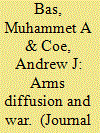

|
|
|
|
|
| Publication |
2012.
|
| Summary/Abstract |
The authors present a model of the relationship between the spread of new military technologies and the occurrence of war. A new technology could shift the balance of power, causing anticipatory war as one side tries to prevent the other from obtaining it. When one side already has it, war is more likely when the shift in power is large, likely, and durable. When neither side has it, war is more likely when the expected shift is asymmetric (e.g., one side is more likely to get it) and when the two sides fear that a war will occur once one of them has it. The authors illustrate the model with historical examples from the spread of firearms (the Musket Wars in precolonial New Zealand) and of nuclear weapons (the end of US nuclear monopoly and the 1967 Six-Day War). A broader implication is that major power competition can unintentionally cause wars elsewhere.
|
|
|
|
|
|
|
|
|
|
|
|
|
|
|
|
| 2 |
ID:
104330
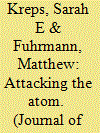

|
|
|
|
|
| Publication |
2011.
|
| Summary/Abstract |
What are the consequences of military strikes against nuclear facilities? In particular, do they 'work' by delaying the target states ability to build the bomb? This article addresses these questions by conducting an analysis of 16 attacks against nuclear facilities from 1942 to 2007. We analyze strikes that occurred during peacetime and raids that took place in the context of an ongoing interstate war. The findings indicate that strikes are neither as uniformly fruitless as the skeptics would suggest, nor as productive as advocates have claimed. There is evidence that the peacetime attacks delayed the target's nuclear program, although the size of this effect is rather modest. The wartime cases were less successful, as attacks often missed their targets either due to operational failure or limited intelligence on the location of critical targets. In our concluding section we show that many of the conditions that were conducive to past success are not present in the contemporary Iran case. Overall, our findings reveal an interesting paradox. The historical cases that have successfully delayed proliferation are those when the attacking state struck well before a nuclear threat was imminent. Yet, this also happens to be when strikes are the least legitimate under international law, meaning that attacking under these conditions is most likely to elicit international censure.
|
|
|
|
|
|
|
|
|
|
|
|
|
|
|
|
| 3 |
ID:
109582
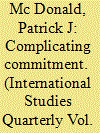

|
|
|
|
|
| Publication |
2011.
|
| Summary/Abstract |
This paper argues that the construction of sustainable peace settlements among great powers rests on a self-enforcing international bargain that impedes rapid shifts in the global distribution of military power and a series of stable fiscal bargains within great powers that both generate sufficient revenues to preserve a military deterrent and prevent programs of rapid armaments expansion. It examines how free resources- public property, natural resource wealth, international transfers, and sovereign lending-insulate governments from having to renegotiate the basic fiscal contract with society and can, as a consequence, create the domestic political capacity to sustain arms races and shift regional and global military balances to their advantage. These claims are examined by comparing the origins of World War I and the Cold War. The reexamination of World War I challenges the prevailing historical consensus by arguing that the primary cause of war lies within Russia rather than Germany. A discussion of early stages of the Cold War shows how the Truman and Eisenhower administrations both considered launching preventive war to solve the same fiscal dilemma faced by German leaders in July 1914.
|
|
|
|
|
|
|
|
|
|
|
|
|
|
|
|
| 4 |
ID:
138305
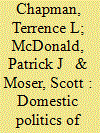

|
|
|
|
|
| Summary/Abstract |
We present a formal model of international bargaining between two states in which one government must negotiate with a domestic opposition faction to secure tax revenue for military spending. The model examines how robust the international order is to domestic political crises that activate a stark trade-off to a governing coalition. Namely, offering fiscal relief to stave off domestic revolution can simultaneously undermine the larger international political order by facilitating military spending that can, under some circumstances, result in sizable shifts in the relative distribution of military power between states. We find that two key domestic conditions influence the likelihood of preventive war: the distribution of income within the state's economy and the relative economic stake that opposition groups possess in international settlements.
|
|
|
|
|
|
|
|
|
|
|
|
|
|
|
|
| 5 |
ID:
149127
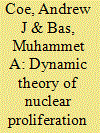

|
|
|
|
|
| Summary/Abstract |
We develop a formal model of bargaining between two states where one can invest in a program to develop nuclear weapons and the other imperfectly observes its efforts and progress over time. In the absence of a nonproliferation deal, the observing state watches the former's program, waiting until proliferation seems imminent to attack. Chance elements—when the program will make progress and when the other state will discover this—determine outcomes. Surprise proliferation, crises over the suspected progress of a nuclear program, and possibly “mistaken” preventive wars arise endogenously from these chance elements. Consistent with the model's predictions and contrary to previous studies, the empirical evidence shows that the progress of a nuclear program and intelligence estimates of it explain the character and outcomes of most interactions between a proliferant and a potential preventive attacker. Counterintuitively, policies intended to reduce proliferation by delaying nuclear programs or improving monitoring capabilities may instead encourage it.
|
|
|
|
|
|
|
|
|
|
|
|
|
|
|
|
| 6 |
ID:
073057
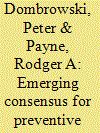

|
|
|
|
|
| Publication |
2006.
|
| Summary/Abstract |
After u September 2001, the George W. Bush administration declared that the United States had adopted a 'pre-emptive' military doctrine to address new threats posed by terrorists and 'rogue states' armed with nuclear, biological or chemical weapons. However, the so-called 'Bush Doctrine' met substantial international opposition when it was proposed - and even more resistance when it was applied to the case of Iraq. Subsequent events in Iraq have not made the idea any more popular. It is somewhat startling, then, that numerous states and international organisations seem now to support the call to revise long-held international understandings about when force might be used. A sizable number agree that the risk of calamitous surprise attacks, especially with nuclear, biological or chemical weapons, might justify preventive strikes or wars against terrorists or their state sponsors. Anew international norm may thus be under construction, though states continue to disagree about the agents of decision and action.
|
|
|
|
|
|
|
|
|
|
|
|
|
|
|
|
| 7 |
ID:
074156
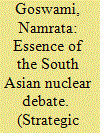

|
|
|
| 8 |
ID:
061236
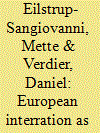

|
|
|
| 9 |
ID:
118159
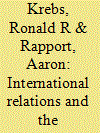

|
|
|
|
|
| Publication |
2012.
|
| Summary/Abstract |
Theories of international relations have often incorporated assumptions about time horizons-a metaphor for how heavily actors value the future relative to the present. However, they have not built on a growing body of experimental research that studies how human beings actually make intertemporal tradeoffs. In this article, we present relevant findings from psychology and behavioral economics, notably those of "construal level theory" (CLT), and explore these findings' implications for three classic questions-international cooperation, preventive war, and coercion. We argue that experimental evidence regarding how people discount future value and construe future events challenges the conventional wisdom on international cooperation. We further maintain that CLT helps explain a longstanding puzzle about preventive wars-namely why they are often initiated too late by declining powers but too soon by rising competitors. Finally, we rely on these findings to explain who wins coercive contests and why compellence is often, but not always, harder than deterrence. Scholars of international relations often embed in their theories crucial assumptions about time horizons, and this article seeks to show what differences it makes if we ground these assumptions in what we know about actual human decision making.
|
|
|
|
|
|
|
|
|
|
|
|
|
|
|
|
| 10 |
ID:
131484
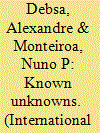

|
|
|
|
|
| Publication |
2014.
|
| Summary/Abstract |
Large and rapid power shifts resulting from exogenous economic growth are considered sufficient to cause preventive wars. Yet most large and rapid shifts result from endogenous military investments. We show that when the investment decision is perfectly transparent, peace prevails. Large and rapid power shifts are deterred through the threat of a preventive war. When investments remain undetected, however, states may be tempted to introduce power shifts as a fait accompli. Knowing this, their adversaries may strike preventively even without conclusive evidence of militarization. In fact, the more effective preventive wars are, the more likely they will be launched against states that are not militarizing. Our argument emphasizes the role of imperfect information as a cause of war. It also explains why powerful states may attack weaker targets even with ambiguous evidence of their militarization. We illustrate our theory through an account of the 2003 US-led invasion of Iraq.
|
|
|
|
|
|
|
|
|
|
|
|
|
|
|
|
| 11 |
ID:
074078
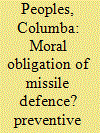

|
|
|
|
|
| Publication |
2006.
|
| Summary/Abstract |
This article aims to assess the moral arguments that have been propounded for missile defence in the post-Cold-War era and to evaluate how these relate to those made for the 'pre-emptive' use of military force. Specific attention is paid to the argument that contemporary missile defence constitutes a form of moral obligation for the United States, a position explicitly advocated by just war theorist James Turner Johnson. Drawing on critiques of similar arguments made in the 1980s, the assumptions of this position are critically assessed. Finally, the article asserts that the general reconfiguration of imminent threats in recent US security strategy gives sustenance to the moral argumentation for missile defence as much as it does the anticipatory use of force more broadly understood, indicating how the two overlap and intersect in this regard.
|
|
|
|
|
|
|
|
|
|
|
|
|
|
|
|
| 12 |
ID:
093619
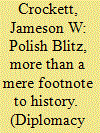

|
|
|
|
|
| Publication |
2009.
|
| Summary/Abstract |
The January 1933 appointment of Adolf Hitler as Chancellor of Germany marked the beginning of the end of the fragile post-war peace throughout Europe. The Polish leadership had good reason to fear his threats of revising the Treaty of Versailles. Realising that Hitler was too dangerous to remain in power, the Polish leadership led by Marshal Jzef Pisudski prepared for a preventive war against Germany. Unfortunately, the appeasement policy among the Western Powers condemned this plan to failure and forced Poland into signing a non-aggression pact with Germany in 1934; thus dooming Poland's existence. To test his premonitions about Hitler, Pisudski created several international "incidents" concerning the Free City of Danzig, designed to test both Germany and whether the Western Powers would fight to uphold the Treaty of Versailles. Pisudski's efforts offer proof that Poland deserves more credit for its determination to deal with a rising tide of Nazi Germany.
|
|
|
|
|
|
|
|
|
|
|
|
|
|
|
|
| 13 |
ID:
068713
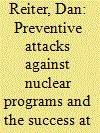

|
|
|
| 14 |
ID:
082055
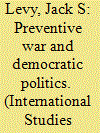

|
|
|
|
|
| Publication |
2008.
|
| Summary/Abstract |
define the concept of preventive war, distinguish it from preemption and other sources of better-now-than-later logic, and examine numerous conceptual issues that confound theoretical and empirical analyses of prevention. I then consider the argument that democracies rarely if ever adopt preventive war strategies because such strategies are contrary to the preferences of democratic publics and to the values and identities of democratic states. I examine a number of historical cases of anticipated power shifts by democratic states, and analyze the motivations for war and the mobilization of public support for war. The evidence contradicts both the descriptive proposition that democracies do not adopt preventive war strategies and causal propositions about the constraining effects of democratic institutions and democratic political cultures.
|
|
|
|
|
|
|
|
|
|
|
|
|
|
|
|
| 15 |
ID:
076998
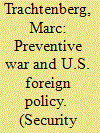

|
|
|
|
|
| Publication |
2007.
|
| Summary/Abstract |
This article examines the claim that the Bush strategy of dealing with developing threats "preemptively" marked a total break with American tradition. It turns out that preventive war thinking played a much greater role in shaping u.s. policy than most people realize. During the early Cold War period, this sort of thinking was by no means limited to the lunatic fringe. Could the United States simply sit back and allow first the Soviets and then the Chinese to develop nuclear capabilities of their own? Many people, both inside and outside the government, were worried about what would happen if America did nothing and thought that the possibility of preventive action had to be taken seriously. In the post-Cold War period, the Clinton administration seemed ready to do whatever was necessary to prevent North Korea from going nuclear; it seemed prepared, in fact, to go to war over the issue. Even in the pre-nuclear world, preventive war thinking played a major role in shaping policy: American policy in 1941 was strongly influenced by this kind of thinking.
|
|
|
|
|
|
|
|
|
|
|
|
|
|
|
|
| 16 |
ID:
076999
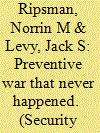

|
|
|
|
|
| Publication |
2007.
|
| Summary/Abstract |
The theory of "preventive war" states that, under certain conditions, states respond to rising adversaries with military force in an attempt to forestall an adverse shift in the balance of power. British and French passivity in response to the rapid rise of Germany in the 1930s would appear to constitute one of the leading empirical anomalies in the theory, one the theory's proponents must explain. After clarifying the meaning of the preventive motivation for war and specifying the conditions under which it should be the strongest, we examine French and British behavior in the crises over the Rhineland in 1936 and Sudeten Czechoslovakia in 1938 through an intensive study of government documents and private papers. We argue that French political leaders, anticipating a continuing adverse shift in relative power, wanted to confront Hitler, but only with British support, which was not forthcoming. British leaders believed, even by 1936, that the balance of power had already shifted in Germany's favor, but that German ascendancy was only temporary and that British rearmament would redress the balance of power in a few years. We contrast our argument with alternative interpretations based on domestic political pressures and ideologically driven beliefs and interests
|
|
|
|
|
|
|
|
|
|
|
|
|
|
|
|
| 17 |
ID:
157825
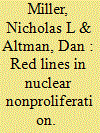

|
|
|
|
|
| Summary/Abstract |
States that seek to prevent nuclear proliferation through threats of force or sanctions often set “red lines,” which set limits on nuclear capabilities beyond which a proliferator must risk triggering a punitive response. Yet despite a wide range of possible red lines that states could choose—for example, constructing a nuclear weapon (weaponization), enriching uranium, or conducting a nuclear test—the academic literature is nearly silent on the tradeoffs inherent in selecting one of these red lines over another. Specifically, what are the vulnerabilities in each red line that proliferators can exploit to advance their nuclear program while limiting the punitive response? To address this question, this article introduces a theory of red lines and how they are challenged. We apply this theory to red lines in nuclear nonproliferation and offer historical evidence to support it.
|
|
|
|
|
|
|
|
|
|
|
|
|
|
|
|
| 18 |
ID:
138304
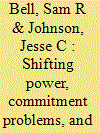

|
|
|
|
|
| Summary/Abstract |
Many scholars argue that leaders' expectations about future shifts in the distribution of power can result in preventive war. If a leader expects her adversary to be significantly stronger in the future, the leader may choose to go to war with that adversary rather than bargain with a stronger adversary in the future. However, quantitative evaluations of this argument prove difficult, as they require a measure of leaders' expectations about future shifts in power rather than simply a measure of observed power. In this paper, we develop an empirical model of future power to create this measure. We then use that measure to evaluate the preventive war hypothesis. Our results support the preventive war hypothesis. Increases in a state's expected future probability of winning in war increase its probability of another state in a dyadic relationship initiating war against it.
|
|
|
|
|
|
|
|
|
|
|
|
|
|
|
|
| 19 |
ID:
153326
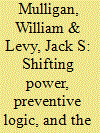

|
|
|
|
|
| Summary/Abstract |
If a declining state has incentives for preventive war, the rising state should have incentives to delay a confrontation until it is stronger. We develop the theoretical paradox and examine the July 1914 crisis. Why did Russia, rising relative to Germany, not adopt a buying-time strategy? We argue that although most Russian leaders hoped to avoid a confrontation, they feared that the failure to support Serbia would lead to a loss of Russian credibility and a significant setback to Russia’s position in the Balkans, one that could not easily be reversed, even with Russia’s expected increase in relative military power.
|
|
|
|
|
|
|
|
|
|
|
|
|
|
|
|
| 20 |
ID:
055395
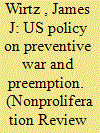

|
|
|
|
|
|
|
|